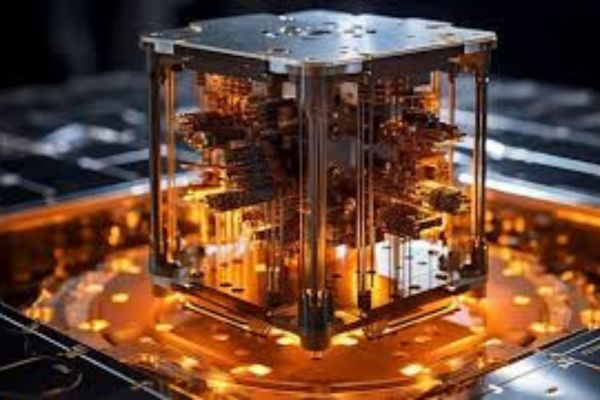If artificial intelligence (AI) is the spark that lit up the world of technology in 2023 and 2024, quantum computing is the fire ready to flame through the next few decades. It is a technology that has jumped directly out of a science fiction book, promising to revolutionise industries with its mind-boggling potential. For manufacturing, specifically, quantum computing is a revolutionary game-changer that has the potential to redefine efficiency, innovation, and competitiveness. But what is quantum computing, and how will it revolutionise the factory floor? Let us take a closer look.
The Quantum Difference: A New Era for Manufacturing
Unlike traditional digital computers, which process information using bits (representing either a 0 or a 1), quantum computers use qubits. These qubits can exist in multiple states simultaneously, as a result of a phenomenon called superposition. When these qubits are entangled, they work together as one system, enabling the computer to process huge amounts of data incredibly fast. This advantage allows quantum computers to tackle problems that would leave even the most powerful supercomputers struggling. Think about it, simulating complex molecules to create new materials or optimising a global supply chain in seconds, these are the types of problems quantum computing is designed to solve, and manufacturing could gain enormously from it.
Manufacturing is accustomed to revolutions in technology, from the steam engine to Industry 4.0’s smart factories. Quantum computing, though, threatens a quantum leap like no other. One of the most thrilling uses is optimisation—a key aspect of manufacturing. A quantum computer can analyse countless real-world factors—like demand changes, supply chain issues, and energy costs—and quickly create the most efficient production schedule, saving millions and reducing downtime significantly.
3D printing, for example, Quantum computing could enable “blind quantum computing,” allowing factories to share proprietary data or designs securely without exposing trade secrets. This opens the door to dynamic networks of factories, where companies collaborate seamlessly to balance production capacity. A factory in Mumbai might lease excess 3D printing capability to a factory in Shanghai, shifting dynamically to cover peaks in demand without sacrificing confidentiality. The result? A more flexible, localised, and secure supply chain.
Material science is another area ripe for transformation. Quantum computers can model molecular structures with greater accuracy than ever before, opening up the prospect of new materials such as advanced composites or sustainable alloys. These might result in lighter, stronger products or even low-carbon technologies like carbon capture catalysts, aligning production with the aspirations of global sustainability.
Real-World Momentum
In November 2024, Microsoft and Atom Computing reported a breakthrough, connecting 24 logical qubits on only 80 physical qubits, a new efficiency record. They are aiming for a 1,000-qubit quantum computer in 2025, a goal that might spur broader industry adoption. Google’s Willow chip, meanwhile, computed an issue in five minutes that a conventional supercomputer would solve in 10 septillion years. These developments indicate that quantum computing is transitioning from laboratories to practical applications.
Start-ups are also driving progress. Across the world, investment in quantum computing reached $1.5 billion in 2024, close to double the sum for the year 2023, reflecting the increased faith in its future potential. India is also entering the quantum space with its National Quantum Mission (NQM), which was initiated in April 2023 with a budget of ₹6,003.65 crore. The NQM plans to create quantum computers with 50–1,000 qubits within eight years, in addition to progress in quantum communication and sensing. Through collaborations across 17 states and four Thematic Hubs, India is becoming a global player, with manufacturing being one of the sectors that will gain from it.
Challenges on the Horizon
Despite its promises, quantum computing is not without challenges. The technology is famously finicky—qubits are sensitive to vibrations, temperature fluctuations, and even cosmic rays, so they are error-prone. Scalability is also a problem, with experts suggesting that useful, large-scale quantum computers are still 10 to 20 years off.
And then there is the “productivity paradox.” As with digital computers, which first dampened productivity growth during the 1970s and 1980s because of integration expense and learning curves, so quantum computing might do the same. Producers will have to spend large sums on new equipment, retrain employees, and redesign business models. Ideas in quantum mechanics are counterintuitive, too, so engineers and managers will struggle to understand their practical applications.
Security is another concern. Quantum computers could potentially crack conventional encryption methods, posing risks to data-heavy industries like manufacturing. This makes the development of quantum-resistant cryptography, such as quantum key distribution, critical.
Navigating the Transition
So, how can manufacturers prepare for the quantum leap? First, they must witness concrete evidence of the value of quantum computing. Manufacturers might begin with small experiments, deploying quantum emulators to optimise supply chains or model materials.
Second, bridging the knowledge gap is essential. Developing a common language, perhaps a quantum equivalent of the Unified Modelling Language used in software development, could help engineers and managers understand and apply quantum concepts. Training programs and partnerships with academia, like those fostered by India’s NQM, will be key.
Lastly, governments and industry need to work together to make the economic transition easier. Public-private partnerships can spur R&D, investment, and innovation. Incentives for implementing quantum-safe encryption and establishing quantum communication networks, such as the quantum internet, could also facilitate the transition.
The Road Ahead
Quantum computing is not just a technological advance, it is a paradigm shift that may redefine the future of manufacturing. From streamlining production lines to creating sustainable materials to making secure, collaborative factory networks possible, its potential is enormous. But to achieve this potential will take patience, investment, and a willingness to venture into the unknown.
The quantum leap is upon us, and manufacturing is leading the way. Those who plan ahead now, accepting the challenges and embracing the opportunities, will define the factories of the future.
















